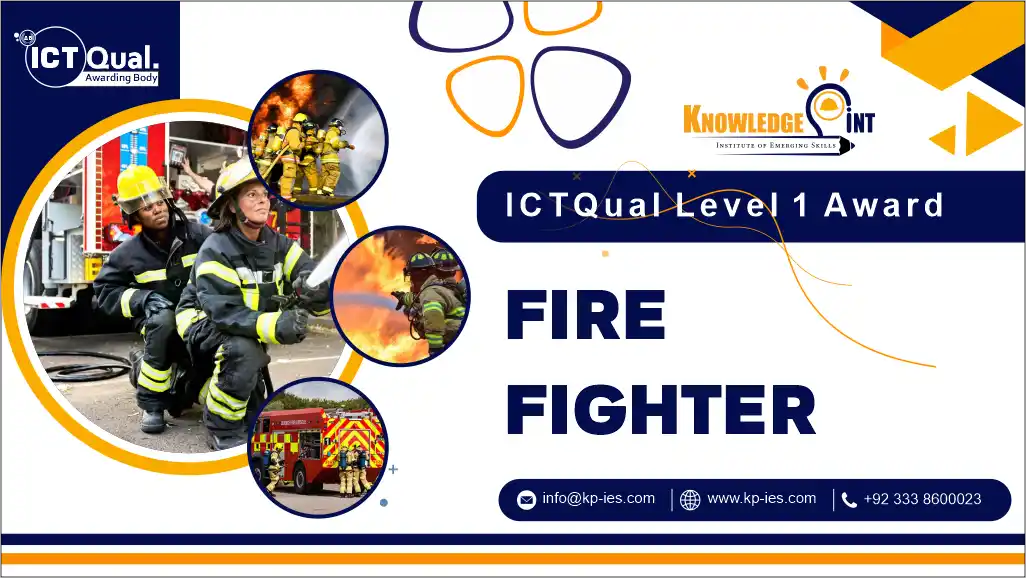In the realm of emergency services, few roles are as vital and impactful as that of a firefighter. The ICTQual Level 1 Award in Fire Fighting is designed to provide essential training and foundational knowledge for those entering the firefighting profession. This qualification equips aspiring firefighters with the skills and understanding necessary to perform their duties effectively and safely.
The ICTQual Level 1 Award in Fire Fighting is an entry-level qualification aimed at individuals who are new to the firefighting profession or seeking to formalize their knowledge in fire safety. This award covers the basic principles of fire fighting, including safety protocols, equipment use, and emergency response procedures.
The ICTQual Level 1 Award in Fire Fighting is a critical step for anyone aspiring to enter the firefighting profession. By providing essential training in fire safety, equipment use, emergency response, and teamwork, this qualification lays the groundwork for a successful career in fire fighting. Investing in this award not only enhances your skills and knowledge but also demonstrates a commitment to safety and professionalism in one of the most challenging and rewarding careers available.
Course Overview
The ICTQual Level 1 Award in Fire Fighter consists of 6 mandatory units which are as follows.
The future progression of the ICTQual Level 1 Award in Fire Fighter can lead learners towards several pathways, depending on their career goals and aspirations in the field of law and related sectors. Here are some potential avenues of progression:
1. Introduction to Firefighting
- Understanding Firefighting Roles:
- Gain a foundational understanding of the roles and responsibilities of firefighters within the emergency services.
- Learn about the structure and functions of fire service organizations and the significance of firefighting in community safety.
- Basic Principles:
- Understand the basic principles of firefighting, including the purpose and importance of fire suppression, prevention, and response.
2. Fire Behavior and Types
- Fire Dynamics:
- Comprehend the fundamental concepts of fire behavior, including how fires start, spread, and are extinguished.
- Learn about the factors influencing fire growth and the various stages of fire development.
- Types of Fires:
- Identify different types of fires, such as structural, wildland, and chemical fires, and understand the specific characteristics and challenges associated with each type.
3. Firefighting Equipment and Techniques
- Equipment Familiarization:
- Recognize and understand the use of essential firefighting equipment, including hoses, nozzles, extinguishers, and breathing apparatus.
- Learn about the maintenance and care of firefighting tools and gear.
- Techniques and Procedures:
- Develop practical skills in applying firefighting techniques, including water application, foam usage, and dry chemical extinguishment.
- Understand how to execute fundamental firefighting procedures safely and effectively.
4. Safety Protocols and Personal Protective Equipment (PPE)
- Safety Protocols:
- Learn the standard safety protocols and procedures to follow during firefighting operations to ensure the safety of both firefighters and civilians.
- Understand the importance of risk assessment and hazard identification in maintaining a safe working environment.
- Personal Protective Equipment (PPE):
- Gain knowledge of the types of personal protective equipment used in firefighting, such as helmets, gloves, boots, and turnout gear.
- Learn how to properly don, use, and maintain PPE to protect against fire hazards and ensure personal safety.
5. Emergency Response and Rescue Operations
- Emergency Procedures:
- Understand the procedures for responding to various types of fire emergencies, including the coordination of resources and communication with other emergency services.
- Learn the basic principles of rescue operations, including techniques for safely rescuing individuals from hazardous environments.
- Incident Management:
- Develop skills in managing and coordinating emergency response efforts, including prioritizing tasks and making quick, informed decisions during incidents.
6. Legislative and Regulatory Requirements
- Legal Framework:
- Learn about the key legislative and regulatory requirements governing firefighting operations, including fire safety laws, codes of practice, and industry standards.
- Understand the legal responsibilities of firefighters and the importance of compliance with regulatory requirements.
- Documentation and Reporting:
- Gain knowledge of the documentation and reporting procedures required for compliance with fire safety regulations, including incident reports and safety audits.
The learning outcomes for the ICTQual Level 1 Award in Fire Fighting provide a comprehensive foundation in essential firefighting skills and knowledge. By understanding fire behavior, mastering firefighting techniques, adhering to safety protocols, and recognizing legislative requirements, individuals are well-prepared to contribute effectively to emergency response and fire safety efforts. This foundational knowledge is crucial for those pursuing a career in firefighting and seeking to enhance their expertise in this vital field.
Course Benefits of the ICTQual Level 1 Award in Fire Fighter :
1. Specialized Expertise
- Auditing Proficiency: Gain specialized knowledge and skills in auditing energy management systems according to the ISO 50001:2018 standard.
- Industry Recognition: Earn a globally recognized qualification that demonstrates your proficiency as an energy management systems auditor.
2. Career Advancement
- Expanded Career Opportunities: Qualify for roles such as Lead Energy Auditor, Energy Management Consultant, or Compliance Officer.
- Higher Earning Potential: Enhance your value to employers and increase your earning potential with specialized expertise in energy management auditing.
3. Industry-Relevant Skills
- Practical Application: Acquire practical skills and techniques for planning, conducting, and documenting energy management system audits.
- Effective Communication: Develop communication skills to interact with auditees, audit teams, and stakeholders effectively.
4. Contribution to Sustainability
- Promotion of Energy Efficiency: Play a key role in promoting energy efficiency and reducing environmental impact within organizations.
- Support for Sustainable Practices: Assist organizations in implementing and maintaining energy management systems that support sustainability goals.
5. Quality Assurance
- Compliance Assurance: Help organizations achieve compliance with ISO 50001:2018 requirements and other relevant regulatory standards.
- Risk Mitigation: Identify areas of non-conformance and provide recommendations for corrective actions to mitigate risks.
6. Continuous Professional Development
- Lifelong Learning: Engage in continuous professional development by staying updated with the latest developments and trends in energy management auditing.
- Networking Opportunities: Connect with industry professionals, auditors, and experts, expanding your professional network and opportunities.
7. Organizational Benefits
- Improved Performance: Contribute to the improvement of organizational energy performance through effective auditing and recommendations for continuous improvement.
- Enhanced Reputation: Help organizations build a positive reputation for their commitment to energy management and sustainability practices.
8. Personal Growth
- Leadership Development: Develop leadership skills to effectively manage audit teams, delegate tasks, and ensure audit objectives are met.
- Confidence Boost: Gain confidence in your abilities as an energy management systems auditor through practical training and hands-on experience.
The ICTQual Level 1 Award in Fire Fighting serves as a crucial entry point for those aspiring to build a career in firefighting. It provides foundational knowledge and skills essential for the role, but the journey doesn’t end there. Here are some potential pathways for further development and career progression after achieving this qualification:
1. Advanced Fire Fighting Qualifications
- ICTQual Level 2 Award in Fire Fighting:
- This qualification builds on the basics covered in Level 1, offering more advanced techniques and knowledge. It covers topics such as complex firefighting strategies, leadership in emergency situations, and advanced equipment handling.
- ICTQual Level 3 Award in Fire Fighting:
- Level 3 provides deeper insights into firefighting management, including supervisory roles, advanced incident command, and strategic planning for emergency responses.
2. Specialized Fire Fighting Training
- Specialist Courses:
- Enroll in specialized training programs that focus on specific areas of firefighting, such as hazardous materials (HAZMAT) handling, high-rise firefighting, or wildland fire management.
- Technical Certifications:
- Obtain certifications in technical areas related to firefighting, such as fire investigation, fire protection systems, or advanced rescue operations.
3. Career Advancement Opportunities
- Firefighter Roles:
- Apply for entry-level firefighter positions where you can put your foundational skills into practice and gain hands-on experience in various emergency scenarios.
- Fire Officer/Station Officer:
- Pursue roles such as fire officer or station officer, where you will be responsible for overseeing firefighting teams, managing resources, and coordinating emergency responses.
- Fire Safety Inspector:
- Transition into roles focused on fire prevention and safety inspections, ensuring compliance with fire safety regulations and standards.
4. Leadership and Management Roles
- Fire Service Leadership:
- Progress to leadership positions within the fire service, including roles such as battalion chief, deputy chief, or fire chief, where you will be involved in strategic planning, policy development, and organizational management.
- Training and Development:
- Become a fire service trainer or instructor, delivering training programs and workshops to new firefighters and other emergency service personnel.
5. Further Education and Professional Development
- Diplomas and Degrees:
- Pursue higher education qualifications in fields related to fire science, emergency management, or public safety to broaden your career options and enhance your professional expertise.
- Professional Memberships:
- Join professional organizations such as the National Fire Protection Association (NFPA) or the Institution of Fire Engineers (IFE) to access additional resources, networking opportunities, and ongoing professional development.
6. Consultancy and Advisory Roles
- Fire Safety Consultant:
- Offer consultancy services to organizations and businesses, providing expert advice on fire safety practices, risk assessments, and compliance with regulations.
- Emergency Management Consultant:
- Specialize in emergency management consulting, helping organizations develop and implement effective emergency response plans and safety procedures.
Completing the ICTQual Level 1 Award in Fire Fighting is just the beginning of a dynamic and rewarding career in firefighting. By pursuing advanced qualifications, specialized training, leadership roles, and further education, individuals can continue to grow professionally and make significant contributions to fire safety and emergency management. Embrace the opportunities for progression and development in this vital field, and take the next steps to advance your career and enhance your impact in the fire service.







